“For us there is but one crime: to be untrue to ourselves.”
– Francis Parker Yockey, 1953
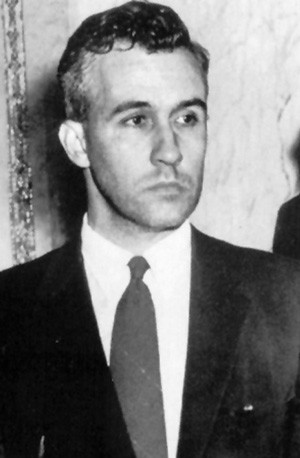 The “Judeo-African cacophony” mesmerizing the jitterbugs on the dance floors of the Thirties was part of a larger program to debauch the conservative Christian rhythms of American life.
The “Judeo-African cacophony” mesmerizing the jitterbugs on the dance floors of the Thirties was part of a larger program to debauch the conservative Christian rhythms of American life.
Such at least was the argument Francis Parker Yockey made in his first published work, “The Tragedy of Youth” (1939).[1]
In this early piece, full of promise and prefiguring aspects of his later critique of American life, the 22-year-old Yockey depicted an America whose youth had begun to keep step with the intonations and inflections of its Jewish bandmasters.
Besides the folly of their un-European cavorting, Americans, he thought, were acting out the worldview of an alien-minded minority in control of the country’s media and entertainment.
Drinking, smoking, and other bad habits glamorized by Hollywood became, in this spirit, marks of sophistication; sports were fetishized; public opinion was shaped and reshaped to legitimate machinations of every sort.
More seriously, God was “replaced by lust, the priest by the psychoanalyst, and the hero and heroine by the promiscuous lounge-lizard and the glittering harlot.”[2]
For the more educated, there were books and magazines promoting class war, racial equality, and anti-European (especially anti-German) hatred – aimed at destroying “whatever exclusiveness, national feeling, or racial instinct” still part of the American people.[3]
Institutionalizing these subversions, Roosevelt’s New Deal, the granddaddy of the present anti-white system, took on debts and obligations favoring the Left forces – themselves puppets of the international financiers and bankers responsible for the deception and dissimulation entrancing the jitterbugs.
Against this backdrop of cultural distortion, usurious state policy, and agitations favoring causes alien to American affairs, the country’s youth, Yockey claimed, was being conditioned to fight as conscripts in liberal, Jewish, and Communist causes inimical to their national interest.
***
The Catholic-educated prodigy of German-Irish descent — already speaking to public meetings of the German-American Bund (40 percent of whose members were Irish), Pelley’s Silver Shirts, and Father Coughlin’s “clerico-fascists” – had an understanding of the New Deal State and its innovative forms of corporate-financial-cultural control –that was virtually unique among American anti-liberals, an understanding inspired by the Conservative Revolution of Oswald Spengler, Carl Schmitt, and Karl Haushofer.
Since the late Forties, Yockey’s opus has animated much of Europe’s vanguard and been vindicated, in the main, by subsequent events. He nevertheless remains a prophet without honor in his native land.
The True America
A certain ambiguity runs through Yockey’s understanding of America. On the one hand, he saw it as a colonial offshoot of European civilization and thus an organic facet of its High Culture.
On the other, he knew that from the beginning there were problems with the “new nation” — problems that disposed it not just to alien influences, but to demonic entreprises endemic to the capitalism that came with its Protestant revolt against Gothic Europe.
The line between inner disposition and outer subversion is accordingly blurred in Yockey – as it was within the larger metahistorical forces affecting the “country” itself.
***
Basic to Yockey’s understanding of America was his belief that it was, at root, an integral and organic part of Europe.
Whenever he spoke of “the true America,” as opposed to the America that had been taken over by the “culture distorters” and become “the enemy of Europe,” it was the America that had originated as a European colony — the America whose “culture” was a branch of Europe’s High Culture — the America whose people still bore traces of the noble, heroic, and Gothic character of their ancestors.
“All colonials,” Yockey felt, “have a certain plane of their being which is susceptible to the centripetal attraction of the mother-soil.”[4] For they share a common history with “the parent-organism” – no matter how much the distorters might insist otherwise.
The true American – i.e., the American whose highest loyalty was to his “mother soil and father culture” – thus instinctively isolated himself from all efforts to betray Europe: like French Canadians and South African Boers who refused to be conscripted by Washington in the Jews’ war against the Third Reich.[5]
A child of European, especially German, culture, Yockey alone among American anti-liberals saw that America’s origin had tied its destiny to that of Europe, and that no matter how many cities the colony built, no matter how many millions of automobiles it turned out every season — no matter, even, how successful it was in reducing Europe to rubble and occupying it — no matter, it (the colony) would never, not in a thousand years, surpass the achievement and destiny of its mother soil and father culture.
To even think it was philosophically absurd.
***
The country that grew from a small, 17th-century European settlement on the Eastern seaboard faced “a vast hinterland populated with hostile savages and untouched with any form of civilization.”[6]
This would be the start of America’s abnormal development, for its frontier represented a confrontation with nature, very unlike the European frontier, which formed a distinct boundary between rival power-units with contending cultural or religious styles and was thus a boundary that of necessity enhanced the state-idea among Europeans — most brilliantly so in Hohenzollern Prussia.[7]
America’s European settlers – especially its hardy Scots-Irish pioneers, who conquered its frontier through “personal will” – would do so with the hardiness and fearlessness once characteristic of the European race, in its urge for great distance and conquest – but, alas, without the formative influence of a regnant state.
(No Celt, anyway, could possibly bear the state, for its alien heel has been kept on his neck for all its history — except, of course, for those English Celts, whose Germanic language and ways made them so different).[8]
But if the absence of a regnant state enhanced the Americans’ admirable sense of “self-reliance, resourcefulness, bravery, and independence,” it also undermined the European idea of the state as the superpersonal expression of the nation’s will.[9]
America and Europe’s High Culture
Revilo Oliver, whose materialism and rationalism exemplified Yockey’s notion of 19th-century thought, claimed his premises were Spengler’s conclusions.[10] Oliver didn’t quite understand, though, that Yockey wasn’t an orthodox Spenglerian — but rather a radical revisionist intent on turning Spenglerian pessimism into a fresh assertion of ascendent European life.[11]
Like his mentor (Spengler), Yockey saw civilizations as spiritual organisms, with distinct ages or cycles attuned to the growth (the possibility) of the inner idea (the “soul”) inherent in their culture. The “organism,” as such, takes the human material at its disposal and “impresses it into its service.”
Unlike Spengler, Yockey thought there was still a good deal of life left in Western culture and thus that it was vital the culture remain true to itself.
But here America’s problem began. While the “true America” was an offshoot of Europe’s High Culture, the country (first as colony, then as sovereign state) lacked an indigenous culture class and a significant nativist articulation, which, as a colony, left it with shallow roots in its mother soil. America especially lacked an inner organic sense of mission or necessity. Without this sense, it had only a creedal identity based on a crusading Prostestanism opened to all the world and ordered solely for the sake of its predetaory capitalism.
The 19th-century ideas of rationalism and materialism, shorn of all faith and instinct, would thus dominate Americans in ways they never dominated Europeans (at least not until 1945). In dismissing all non-utilitarian and non-economic considerations, such rationalist-materialist ideas left Americans increasingly indifferent to Europe’s destiny, and ultimately defenseless before the ethnocidal dangers intrinsic to their purely monetary (i.e., cultureless and thus amoral) enterprise.
***
This was especially the case once liberal modernity roared onto the scene (1861–65 was the transitional period), turning rationalism and materialism into the unmitigated rule of money and commerce. Money, Yockey held, was the enemy of authority, being private, individualistic, and, ultimately, irresponsible.[12]
Here again, America, product of England’s predatory Whig Oligarchy, differed from Continental Europe. For the High Culture relegates the productive and reproductive aspects of life (the economic aspects, however vital they may be to survival) — to the lowest order of existence.[13]
The American, as such, was preeminently a “capitalist” — motivated by the will to accumulate, prosper, and thus demonstrate his individual salvation. As Spengler put it, he was a Calvinist rather than a Pietist, a Viking rather than a knight, and a pirate whose instinct favored personal gain and not the knight’s devotion to Duty and Destiny.[14]
There was, as a consequence, no aristocratic and priestly estates in America to serve as the culture’s guardian, only economic forces oriented to the lower animal aspects of existence.
In the New World, the Faustian will to power of Europe’s High Culture became a soulless mechanization, whose technical fixation on immediate sensate phenomena left it oblivious to higher realities.
Their enchantment with technics and capitalist ethic of quantification would eventually lead these colonials to see Europeans as inferior to themselves — especially once their flying fortresses incinerated much of the Continent’s millennial heritage.
The hard-headed apostles of science and rationality, economically fixated on comfort and pleasure (“the pursuit of happiness”) have, it follows, been more inclined to feminine principles than to virile exploits or metaphysical perspectives.
The abstract ideological principles of the colonies’ Masonic, Deist, and Unitarian elites, who based their new nation on a scrap of paper (the Constitution), ostensively founded the nation on “the rule of reason, humanity, justice and all the rest,” but in actuality their novel enterprise was little more than a caricature of the European “nation-idea,” dedicated to legitimating the great money-making possibilities inherent in the country’s speculative development.
Without a dynastic, cultural, or historical identity, the “new nation” was bereft of true politics, knowing only the business of partisan haggling.[15]
“The empty, smiling face, the uniform mind, the senseless chasing after noise, movement, and sensation, the obsession with money, the rejection of all spiritual standards of attainment” – this was the condition of Yockey’s jitterbugs, who hadn’t a clue as to what kind of world was being designed for them.[16]
Politically and culturally, such tendencies made America an enterprise without grand possibility, evident in the fact that the American people never achieved a true sense of nationhood or statehood — that the country lacked both a ruling class and a culture stratum — and that, from the beginning, spiritual and transcendent principles were subordinated to materialist ones – thereby preparing the way for the money-changers, whose alien forms of parasitism would facilitate their rapid ascension into the inner circles of America’s plutocratic money elites.
America’s outremer “primitiveness” was especially evident in the condition of the Negro, who constituted a sort of paradigm for the country as a whole.
Incapable of tragedy, pleasure-seeking, and child-like, the Negro, like the culturally-distorted American, exemplified “natural man” — incapable of abstraction, without a virile sense of history or honor, with no art and no will to destiny, fixated almost solely on happiness, status, and sensate vocations. This feminine-matriarchal people devoted to routine and technicization could not, then, but orient to the lowest common denominator.
The Culture of Distortion
Given their shallow culture and the dismissal of the tradition to which they were heirs, Americans were particularly vulnerable to the corrosions of 19th-century rationalism and materialism. Relatedly, they were an easy mark for “culture aliens” — for a world governed by money was a world indifferent to a man’s qualities.[17]
Foremost among the culture-aliens were the Jews: product of Spengler’s “Magian” culture, instinctually hostile to the European spirit, and bent on revenge.
In their counting houses, Americans would invariably overlook the Jews’ otherness, though they were of a different “Culture-Nation-Race.” Even before the War of Independence, they treated Jews as Europeans – Jews who had been shunned, ghettoized, and seen by most Europeans as an evil to be avoided.[18]
In traditionless, rationalized, money-worshipping America, the Jew, as culture and nature dictated, would effortlessly spread their “culture-pathology.”
Notions of “culture-parasitism” and “culture-retardation,” integral to Yockey’s analytical perspective, are familiar forms of cultural pathology and largely self-explanatory. The notion of “culture-distortion,” though roughly analogous to Spengler’s “pseudomorphorsis,” is entirely Yockey’s and plays a leading role in his understanding of America’s 20th-century experience in anti-Europeanism.
“Culture-distortion,” he explains, “is the condition in which outer life-forms [divert] the culture from its true life-path.”[19] The culture-distorter thus assumed control of the host organism by introducing alien elements into it that squandered its energies on things unrelated or opposed to its development. Culture-distortion would consequently end up mutilating the culture-organism, turning it away from its growth, its possibility, its destiny.
Beginning in the 1880s, the Jews (these inassimilable aliens rejected by Europe’s High Culture) began their invasion of America. By 1905, they were already a power, evident in fact that the United States, for the first time in its history, severed diplomatic relations with Russia on account of the “anti-Jewish pogroms” that had followed the Russo-Japanese War.
***
Through its financial acumen and early control of media (the press, movies, radio), and in alliance with the native forces of decadence and degeneration, Jewish power in the New World grew at an unprecedented rate.
In a country where “mass-thinking, mass-ideals, and mass-living prevails,” Jewish propaganda (in the form of advertising, fashion, and a hundred other things) effortlessly reshaped the American consciousness, propelling the jitterbugs onto the dance floor of their world-conquering schemes. Stories of German sadism or Orson Welles’ Mars invasion were peddled with similar success, just as “the ethical syphilis of Hollywood and the spiritual leprosy of New York” infiltrated the larger cultural body.
In 1933, the year of the European Revolution, the Jews acquired outright political control of the United States — something that a thousand years of effort had failed to achieve in Europe.
From this point forward, “the formation of the Jewish-American Symbiosis begins.”[20]
Swarming into Washington, Jews and their “sub-American” contractors started dissimulating the Jewish world view and “bringing under control every factor of public expression.”[21]
All who resisted were to be purged or ostracized.
Then, as the country’s racial instincts were worn down by the distorters, America (in accord with the policies of its liberal state and in the programming of its Culture Industry) assumed “a Jewish countenance” in its relations both with the rest of the world and with itself.[22]
For Yockey, Franklin Roosevelt, “the monster . . . who made of his life a study in infamy,” was a creature of the Jews, just as his New Deal was bent on Judaifying American government and society, promoting, as it did, principles of tolerance and universal brotherhood, which were further developed by Rockerfeler-funded social-engineers intent on morally disarming the American people.
In this, the prescient Yockey might be criticized for confusing Jewish supremacy with the increasing Judaification of American society (which Matthew Arnold had warned of in the 1860s), for Jewish power in America was arguably not consolidated until the late 1960s (even if its secular low-church market, in making money the ultimate standard, had already Judaicized American life and sentiments).[23]
That Roosevelt, in October 1937, began to maneuver the United States into the coming world war and that this war would be a war of annihilation — i.e., the sort of war fought between racially and culturally alien, rather then related peoples sharing the same civilization — was further evidence, in Yockey’s eyes, of Jewish hegemony and the Jews’ genocidal hatred of Europe.
Despite a certain exaggeration of Jewish power in this period, Yockey was nearly alone in seeing that the United States had become an anti-European power bound to the Jews’ vengeful compulsion to suppress Europe’s destiny.
Unlike other American anti-liberals, anti-Semitism for him evolved, rapidly and logically, into an anti-Americanism.
The Enemy of Europe
As long as America had been ruled by men of European Christian stock, it remained “a European colony.”[24] But the America “distorted by the Revolution of 1933″ (a revolution carried out by the allegedly Jewish-dominated New Deal), was now lost to Europe.
America’s Judified anti-Europeanism was especially evident in the Second World War and in its subsequent occupation of the Continent.
For if the United States had possessed a proper ruling class, a tradition, and a regalian state, it would have stayed out of the Second World War, which became a defeat not just for Germany, but for all Europe — and thus, ultimately, a defeat for the true America.
Under its new Jewish-American regime, Washington after 1933 was instrumental in preparing the way for another European civil war – a war it would wage as if the enemy (their European kinsmen) weren’t human.[25]
Instead of being the great moral crusade against the absolute evil of fascism, the war in actuality represented a giant step toward the Judeo-plutocratic inauguration of a New World Order, based on American open markets and American economic practices.
To this end, American bombers (supported by their British vassals) reduced every German city to a heap of rubble, intentionally targeting heavily populated working-class residences — that is, “homes and families”; cities in France, Belgium, Holland, Italy, and Eastern Europe were also bombed, adding further hundreds of thousands of civilian casualties to US “kills”; American fighter-pilots similarly sought out civilians to machine-gun and terrorize; vast stores of equipment and armaments, often denied to American troops, were supplied to Soviet Russia to defend the Communist state and encourage its penetration into the heart of Europe; and throughout this most barbaric and punitive war in the white man’s history, the Washington regime talked incessantly of the enemy’s “war crimes” and its “inhumanity.”[26]
Yockey blamed America’s dishonorable conduct in the war on the culture-distorters, whose “motivation derived from the deep and total organic irreconcilability between a High Culture and a parasitic organism” (though I suspect that the country’s latter-day Puritans, given their tendency to dehumanize the enemy, ought also to share a large part of the responsibility).[27]
Even after the guns were silenced, America’s “ghastly dishonor” continued.
With the Red Army occupying Eastern Europe and the US Army Western Europe, the looting, raping, pillaging — and ethnic cleansing — began.
The Soviets plundered everything not bolted down; the greatest mass rape in Western history occurred in what became “East Germany”; and 16 million East-European Germans were forced to abandon lands and homes they had inhabited for centuries, 2 million of whom (mainly the very old and the very young) perished in the process.
With greater discrimination, the Americans raided German patent offices, stealing their superior technology; they rounded up their rocket scientists, confiscated the libraries they hadn’t burned, and made off with priceless art works. German women, most on the verge of starvation, were not subject to mass rape (except by black American and French African troops), but their favors could be had for a half-dozen eggs, some cigarettes, or a few chocolate bars.
If this weren’t enough, the culture-distorters (whose “fury had been heightened by the European Revolution of 1933″)[28], along with their American accomplices (especially the budding military-industrial complex), introduced large-scale starvation, abused POWs (several million of whom died as a consequence), hunted down anyone who failed to bow to the new conquerors, and imposed laws with ex post facto application.[29]
Adding insult to injury, the “American world-clown and the sadistic Jew” then endeavored to “re-educate” Europeans in the arts of anti-fascism, mammon-worship, and democracy (i.e., “the corruptibility of the government by private wealth”).
The war for Yockey represented a categorical defeat for the “true America” — and a total victory for the Jews over Western Civilization.
***
Since 1945, the two sides of the Atlantic have ceased to share the same inner experience of feeling, for it was essentially a war against Europe. European Americans who supported it, Yockey contended, were traitors — inner enemies of their own culture.[30]
Then, after being reduced to “a beggar colony of America,” Europe’s pre-1945 elites were replaced by “Michel elements” (liberal philistines embodying “the sum of European weaknesses”), who could be trusted to do the Jews’ bidding.
In the name of democracy, press rights and free speech were henceforth abrogated; political parties were required to obtain licenses; any expression of nationalism was criminalized, just as all anti-liberal formations critical of the occupiers’ regime were driven to the political fringe.
America-Jewry in this way sought to sever Europe’s roots, suppress her will to power, and deprive her of a sense of destiny.
In no meaningful political sense did Europe, in fact, continue to exist after 1945, thanks almost entirely to this monstrous entity with the Jewish head and the American body.[31]
America-Jewry’s anti-European vengeance was especially evident in comparison to its generous treatment of defeated Japan.
Indeed, the entire nonwhite world was soon made to know that the United States had conquered Europe and that the colored outer-revolt, encouraged by the distorters, was ready, at last, to triumph over its former white masters.
More than Soviet Communism, Yockey argued that Jewish-controlled America was the “enemy of Europe.”[32]
And this made America an enemy of “true America,” for the Jewish idea of America — as a land of immigrants, creedal propositions, and universal brotherhood — stripped it of any “national-spiritual significance” it may have once had, doing so, ultimately, for “the enslavement of the world by big business.”[33]
Every European-American loyal to his ancestral homeland — loyal to his own inmost being – was, Yockey concluded, duty bound to be disloyal to what America had become (even as he struggled to return it to Europe).
The American Vabanquespieler
Yockey believed the 19th-century Age of Materialism and Rationalism, which had shaped America’s cultureless civilization and opened the way to the culture-distorters, came to an end with the First World War (1918), as a new age struggled to succeed it – a new age that would be animated by the same primordial sources that had brought about the European Revolution of 1933.
If not for America-Jewry’s Old Testament war on Europe, German-Prussian Ethical Socialism (in rejection of liberalism’s individualistic Reign of Quantity) would have inaugurated a New Age of Authority, Discipline, and Faith, bringing the whole world under Europe’s influence. Instead, the very opposite occurred.[34]
But even though the America of the culture-distorters had emerged victorious from the war, it changed not in the least the fact that America (this apotheosis of the 19th-century rationalism and materialism born of liberalism) still represented the past — and the past, Yockey held, could never defeat the future latent in Europe’s High Culture.
The barbarian victory of America’s 19th-century capitalism over the Germans’ Ethical Socialism had, indeed, already spread chaos and disorder throughout Western Civilization, heightening the imperative for a revolutionary transformation.[35]
***
All Yockey’s written works (several of which are works of genius) — all his tireless efforts to rally the defeated and demoralized anti-liberal vanguard for the coming struggle against America-Jewry — his alliance with and clandestine service to Slavic Communism in its Cold War against America’s Jewified liberalism — everything about this extraordinary man whose entire existence was devoted to the realization of Europe’s destiny makes him, in my mind, an exemplar of what Ernst Jünger called the Vabanquespieler.
“A player of dangerous games,” “an adventurer willing to stake all on the throw of the dice,” a hero forged in storms of steel, a nature with the grandeur of a medieval knight[36] — Yockey the Vabanquespieler stood against the entire postwar era, heralding a coming global war between Europe and anti-Europe — between the white men of the North and America’s Jewish culture-distorters.
***
After a half year in Ireland’s enchanted west (1948), where he wrote his magnum opus, Yockey the Vabanquespieler set out to “build a new pan-European fascist superpower,” by rallying the scattered remnants of Europe’s defeated elites to a new assertion of Europe’s destiny — somewhat in the way 7th and 8th-century Irish monks had tried to keep the lights of the old civilization from going out on the mainland.[37]
Rejecting the “petty stateism” of the interwar movements and accounting for their mistakes, Yockey in 1949 founded the European Liberation Front, whose revolutionary-nationalist principles — particularly in its anti-Americanism and pro-Sovietism — were rejected by England’s pro-American Union Movement; then by Continental Hitler-worshippers, who preferred a strictly racialist to a European-culturalist orientation; and, finally, by American anti-liberals (like Revilo Oliver) rooted in 19th-century rationalism and materialism.
Yockey’s European Liberation Front nevertheless dissimulated ideas, especially relevant to our age of American decline, that have since found their way into the most advanced sections of Europe’s anti-liberal resistance: evident in Jean Thiriart’s Euronationalism, in the pan-Europeanism and anti-Americanism of Alain de Benoist’s Nouvelle Droite, in Robert Steuckers’ Euro-Synergies, and in numerous national-revolutionary tendencies beginning with Yockey, René Binet, Saint-Loup, and others in the late 1940s.[38]
Only in America, lacking an indigenous anti-liberal tradition and an organic bond to Europe’s living tradition, are his never-more-pertinent ideas still ignored.[39]
***
For the Vabanquespieler, the creation of a new European order (in the form of a Continental imperium stretching “from Galway to the Urals”) would entail a great, heroic undertaking, as the white men of the North, sworn to a transcendent idea, rallied to throw off an exhausted, putrefied, but nearly all-powerful Jewish-American system — citadel of world liberalism and hence the principal source of evil in the 20th and 21st centuries (more so even than England’s “evil empire” of the 18th and 19th centuries).
The Last Men of America’s consumer paradise may therefore think the distorters have tamed the forces of history and quieted the demands of destiny, but the American apostate knew better. He also knew that Americans could do better.
The beating of the [American] people into a thing of mass-ideals, mass-thinking, mass-conduct, mass-living, was a distortion . . . of the American’s [European] soul. Europe and America constituted a single spiritual unit whose life-aim was to actualize their common destiny.[40]
The coming Age of Absolute Politics, he prophesied, would again “summon forth the latent heroism of the American people.”
Inspired thus, the Vabanquespieler stood with valor against the Jew-run, liberal-capitalist, anti-European Mammon System that had become America.
***
In anticipating the next cycle of Western Destiny, Yockey’s life work bequeaths to New World Europeans a legacy affirming that “the old Gothic religious idea” is still latent in them and that the 21st century will be an age of European peace and order, if they are prepared to fight for it.
The “American ideology” may therefore have no future, but “the soul of the American people,” born of Europe, will be reborn with Europe’s assumption.[41]
Notes
1. Francis Parker Yockey, “The Tragedy of Youth” (1939), at http://home.alphalinks.com.au/~radnat/fpyockey/index [2].
2. Kerry Bolton, ed., Francis Parker Yockey and the ELF Frontfighter (Paraparaumu Beach, NZ: Renaissance Press, 1998), 14-15.
3. Francis Parker Yockey, The Enemy of Europe, trans. T. Francis (York, SC: Liberty Bell, 1981 [1953]), 3.
4. Kerry Bolton, ed., Varange: The Life and Thought of Francis Parker Yockey (Paraparaumu Beach: Renaissance Press, 1998), 31–39
5. Francis Parker Yockey, “The Proclamation of Europe of the European Liberation Front” (1949), at http://home.alphalinks.com.au/~radnat/fpyockey/index [2].
6. Ulick Varange (Francis Parker Yockey), Imperium: The Philosophy of History and Politics (Costa Mesa: Noontide Press, 1962 [1948]), 445.
7. Yockey, Imperium, 323.
8. Bryan Sykes, Saxons, Vikings, and Celts: The Genetic Roots of Britain and Ireland (New York: Norton, 2006).
9. Yockey, Imperium, 125–28, 134.
10. Revilo P. Oliver, The Enemy of Our Enemy (York, S.C.: Liberty Bell, 1981), 17.
11. This was the basis of Julius Evola’s critique of Yockey; see his “Spiritual and Structural Presuppositions of the European Union” (1951), at http://thompkins_cariou.tripod.com/id54.htm [3].
12. Yockey, Imperium, 345.
13. Yockey, Imperium, 43.
14. Oswald Spengler, Prussianism and Socialism [1919], trans. D. O. White, at http://www.worldfuturefund.org/wffmaster/Reading/Germany/P%20Soc/Prussianism.Socialism.htm [4].
15. Yockey, The Enemy of Europe, 73.
16. Yockey, Imperium, 508.
17. Yockey, “The Proclamation of London.”
18. Francis Parker Yockey, “The Destiny of Europe” (1955), at http://home.alphalinks.com.au/~radnat/fpyockey/index [2].
19. Yockey, Imperium, 404.
20. Yockey, The Enemy of Europe, 23.
21. Francis Parker Yockey, “The World in Flames: An Estimate of the World Situation” (1961), at http://home.alphalinks.com.au/~radnat/fpyockey/index [2].
22. Yockey, “The World in Flames.”
23. Matthew Arnold, Culture and Anarchy (Cambridge: Cambridge University Press, 1960 [1869]).
24. Yockey The Enemy of Europe, 3.
25. Dirk Bavendamm, Roosevelts Krieg: Amerikanische Politik und Strategie 1937–1945 (Munich: Herbig, 1993).
26. Jörg Friedrich, The Fire: The Bombing of Germany 1940–1945, trans. A. Brown (New York: Columbia University Press, 2006); Maximilian Czesant, Europa im Bomben-Krieg 1939–1945 (Gras: Stocken, 1998).
27. Yockey, Imperium, 219, 545.
28. Yockey, Imperium, 574.
29. Giles MacDonogh, After the Reich: The Brutal History of the Allied Occupation (New York: Basic Books, 2007); James Bacque, Other Losses: An Investigation into the Mass Death of German POWs after World War Two, 2nd ed. (Boston: Little, Brown and Co., 1999); James Bacque, Crimes and Mercies: The Fate of German Civilians under Allied Occupation (Boston: Little, Brown and Co., 2007); Ralph F. Keeling, Gruesome Harvest: The Costly Attempt to Exterminate the People of Germany (York, SC: Liberty Bell, 2004); Alfred M. De Zayas, A Terrible Revenge: The Ethnic Cleansing of the East European Germans (New York: St. Martin’s Press, 1994).
30. Yockey, The Enemy of Europe, 47.
31. Yockey, Imperium, 192–93; The Enemy of Europe, 59.
32. Kerry Bolton, “Yockey and Russia: Lessons for the Present and Future from the Author of Imperium,” forthcoming.
33. Oswald Spengler, Prussianism and Socialism, §23.
34. Yockey, The Enemy of Europe, 19.
35. Yockey, The Enemy of Europe, 30. Cf. Jean Parvulesco, Dans la forêt de Fontainebleau (Paris: Alexipharmaque, 2007).
36. Kevin Coogan, Dreamer of the Day: Francis Parker Yockey and the Postwar Fascist International (Brooklyn: Automedia, 1999), 148–49. (Coogan misspells the word as “Vanbanquespieler.”)
37. Kevin Coogan, “Lost Imperium: The European Liberation Front (1949–54),” Patterns in Prejudice XXXVI:3 (2002).
38. Francis Parker Yockey, Le prophète de l’Imperium (Paris: Avatar Éds., 2004), 15; Nicolas Lebourg, Le Monde vu de la plus Extrême Droite: Du fascisme au nationalisme-révolutionnaire (Perpignan: Presses Universitaires de Perpignan, 2010).
39. Cf. Ted Sallis, “The Overman High Culture: Future of the West,” http://www.counter-currents.com/2010/10/the-overman-high-culture-future-of-the-west/ [5].
40. Yockey, Imperium, 550–51.
41. Yockey, Imperium, 551; Raymond Abellio, Assomption de l’Europe (Paris: Flammarion, 1978 [1953]).
Source: The Occidental Quarterly, vol. 10, no. 4 (Winter 2010–2011); re-edited June 2013.
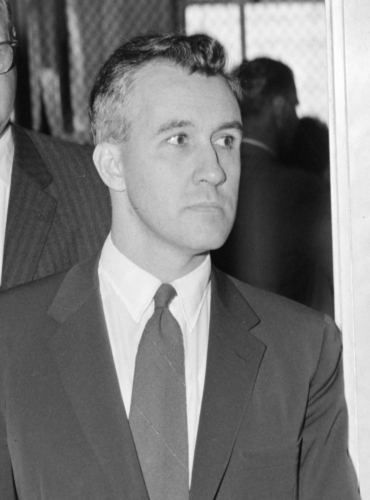 RPO in the Yockey Biographies
RPO in the Yockey Biographies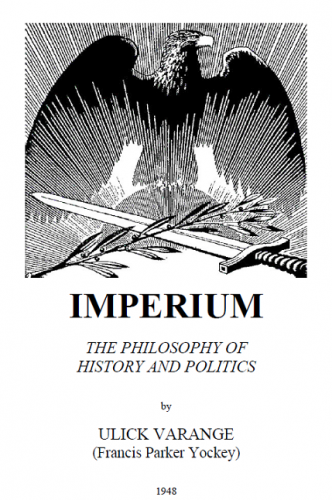 Writing in 1963, Oliver avoids mention of Yockey’s “culture-distorter” or the Jewish Question (although he makes a nod to that Birchite proxy, the International Communist Conspiracy). Years later, with the “Birch Business” well behind him, Oliver would be more explicit.
Writing in 1963, Oliver avoids mention of Yockey’s “culture-distorter” or the Jewish Question (although he makes a nod to that Birchite proxy, the International Communist Conspiracy). Years later, with the “Birch Business” well behind him, Oliver would be more explicit.


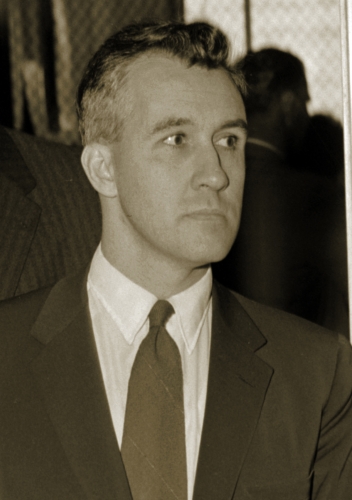
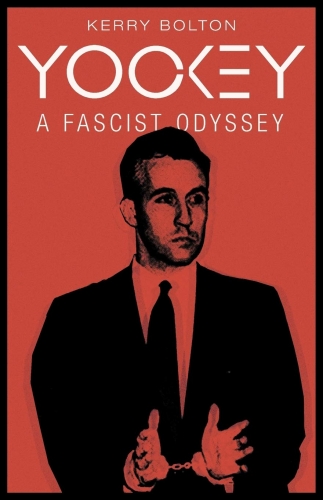
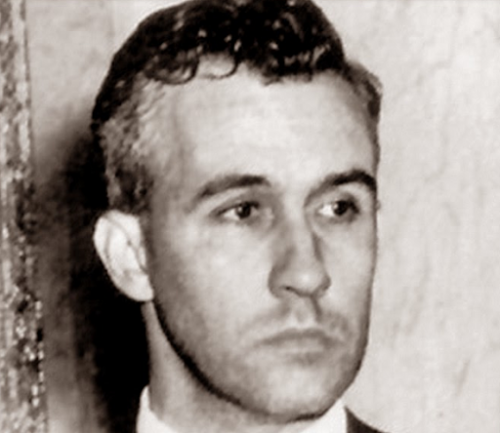
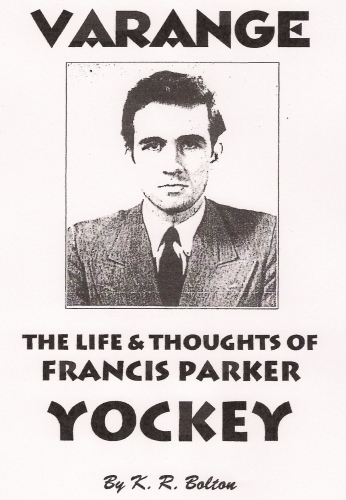
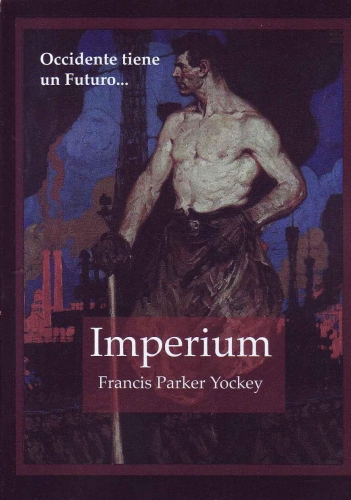
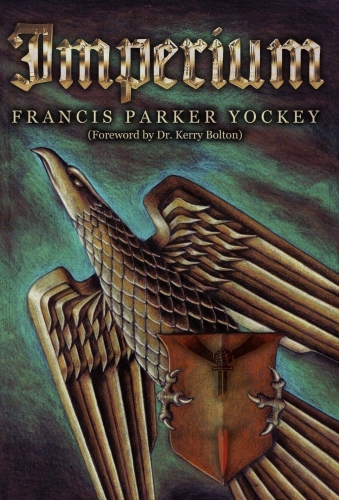
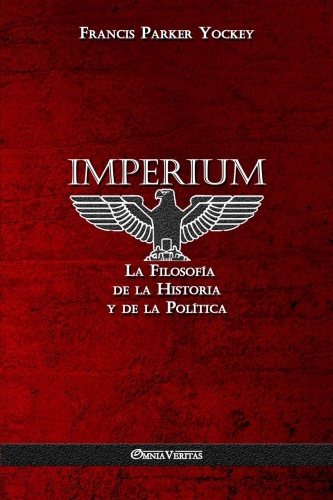
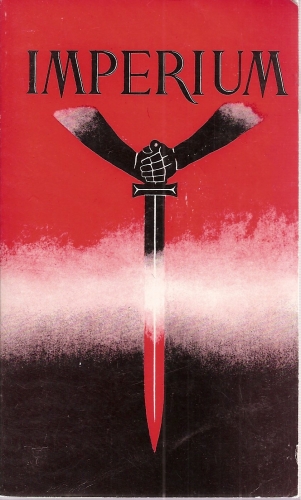
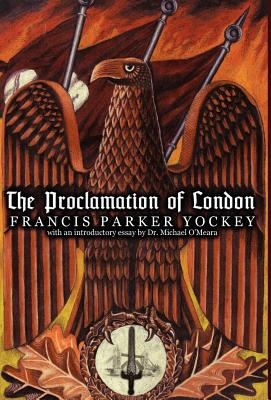 Je note aussi la haute opinion du Dr. Revilo Oliver concernant Yockey et Imperium (un livre dont Oliver pensait qu’il pouvait servir de fondement à un mouvement gagnant ; Oliver était aussi enthousiasmé par TRUD, soit dit au passage) ; je note aussi l’idée d’Oliver selon laquelle nous devons promouvoir des mèmes pour tous les niveaux de compréhension, pour les masses aussi bien que pour l’élite (ce que j’ai recommandé pour le concept d’EGI). L’enthousiasme d’Oliver pour le yockisme est en opposition avec l’ignorance de Yockey de la part de la faction Pierce/Strom/NA, mais nous en connaissons la raison (voir les commentaires sur « Robertson » ci-dessous) ; apparemment, Pierce ne lut jamais Imperium (je suis choqué, choqué). Le Dr. Oliver est un parfait exemple de la manière dont quelqu’un qui est un « matérialiste racial » obsédé par les gènes peut malgré tout être un partisan convaincu de Yockey et d’Imperium. En fait je dirais que la génétique moderne des populations, en analysant le génome autosomal, soutient en fait certaines des idées de Yockey ; par exemple, cet extrait d’Imperium :
Je note aussi la haute opinion du Dr. Revilo Oliver concernant Yockey et Imperium (un livre dont Oliver pensait qu’il pouvait servir de fondement à un mouvement gagnant ; Oliver était aussi enthousiasmé par TRUD, soit dit au passage) ; je note aussi l’idée d’Oliver selon laquelle nous devons promouvoir des mèmes pour tous les niveaux de compréhension, pour les masses aussi bien que pour l’élite (ce que j’ai recommandé pour le concept d’EGI). L’enthousiasme d’Oliver pour le yockisme est en opposition avec l’ignorance de Yockey de la part de la faction Pierce/Strom/NA, mais nous en connaissons la raison (voir les commentaires sur « Robertson » ci-dessous) ; apparemment, Pierce ne lut jamais Imperium (je suis choqué, choqué). Le Dr. Oliver est un parfait exemple de la manière dont quelqu’un qui est un « matérialiste racial » obsédé par les gènes peut malgré tout être un partisan convaincu de Yockey et d’Imperium. En fait je dirais que la génétique moderne des populations, en analysant le génome autosomal, soutient en fait certaines des idées de Yockey ; par exemple, cet extrait d’Imperium :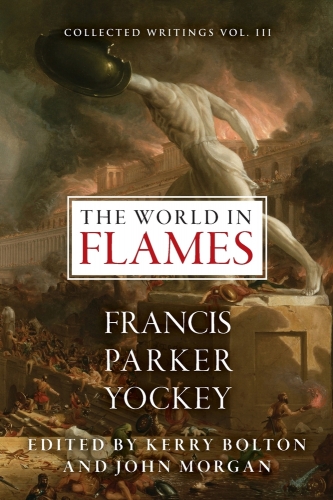
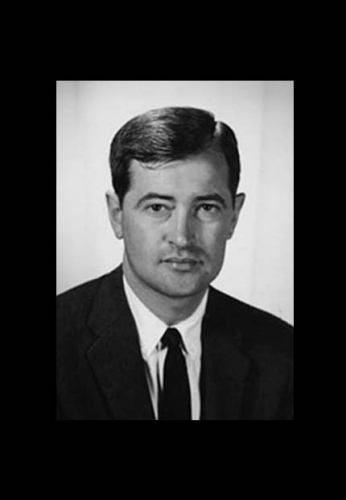 Concernant la relation de Carto (photo) avec le yockisme, celle-ci est bien couverte par Bolton, et discutée par d’autres ailleurs, donc je ne vais pas m’attarder là-dessus, bien que je croie que Gannon était bien trop critique de Carto (bien sûr la critique de Carto par Gannon s’appliquerait aussi à mes propres vues, donc je ne suis pas objectif ici). Bolton décrit d’autres interprétations de Yockey, incluant celle des odinistes ; je ne peux pas discuter de tout cela par manque de temps.
Concernant la relation de Carto (photo) avec le yockisme, celle-ci est bien couverte par Bolton, et discutée par d’autres ailleurs, donc je ne vais pas m’attarder là-dessus, bien que je croie que Gannon était bien trop critique de Carto (bien sûr la critique de Carto par Gannon s’appliquerait aussi à mes propres vues, donc je ne suis pas objectif ici). Bolton décrit d’autres interprétations de Yockey, incluant celle des odinistes ; je ne peux pas discuter de tout cela par manque de temps.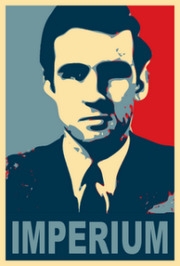 Concernant la terminologie, une analyse plus complète du yockisme requerra des définitions plus précises de termes comme « race horizontale », « race verticale », « verticalisme » et tout le reste, incluant le « pessimisme spenglerien » aussi bien que les diverses « maladies de la culture » de Yockey. En parlant de terminologie, Yockey s’illusionnait peut-être un peu en pensant que « Impérialisme » est plus convenable que « Fascisme », mais encore une fois, dans la période de l’après-guerre immédiat peut-être que c’était vrai. Mais certainement plus maintenant.
Concernant la terminologie, une analyse plus complète du yockisme requerra des définitions plus précises de termes comme « race horizontale », « race verticale », « verticalisme » et tout le reste, incluant le « pessimisme spenglerien » aussi bien que les diverses « maladies de la culture » de Yockey. En parlant de terminologie, Yockey s’illusionnait peut-être un peu en pensant que « Impérialisme » est plus convenable que « Fascisme », mais encore une fois, dans la période de l’après-guerre immédiat peut-être que c’était vrai. Mais certainement plus maintenant.
 del.icio.us
del.icio.us
 Digg
Digg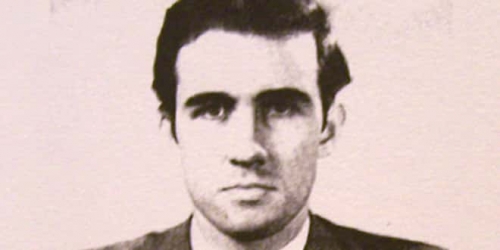
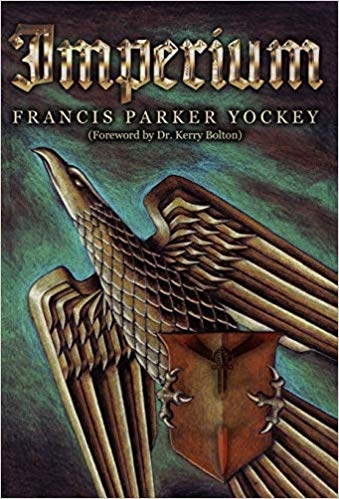 René Girard a parlé de l’Amérique comme puissance mimétique. Sur cette planète de crétins en effet tout le monde veut devenir américain, y compris quand il s’agit de payer des études à quarante mille euros/an, des opérations à 200 000 euros, de devenir obèse et même abruti par la consommation de médias et d’opiacés...
René Girard a parlé de l’Amérique comme puissance mimétique. Sur cette planète de crétins en effet tout le monde veut devenir américain, y compris quand il s’agit de payer des études à quarante mille euros/an, des opérations à 200 000 euros, de devenir obèse et même abruti par la consommation de médias et d’opiacés...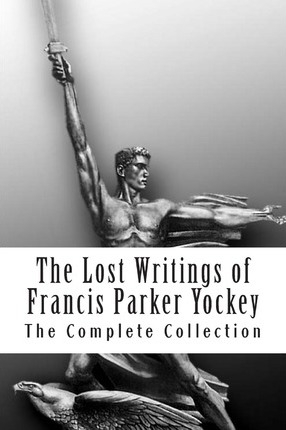 Le cinéaste Tim Burton a bien moqué ce comportement homogénéisé/industriel dans plusieurs de ses films, par exemple Edouard aux mains d’argent. Kazan avait fait de même dans l’Arrangement. Aujourd’hui ce comportement monolithique/industriel s’applique à l’humanitaire, à la déviance, à la marginalité, au transsexualisme, au tatouage, au piercing, etc.
Le cinéaste Tim Burton a bien moqué ce comportement homogénéisé/industriel dans plusieurs de ses films, par exemple Edouard aux mains d’argent. Kazan avait fait de même dans l’Arrangement. Aujourd’hui ce comportement monolithique/industriel s’applique à l’humanitaire, à la déviance, à la marginalité, au transsexualisme, au tatouage, au piercing, etc. 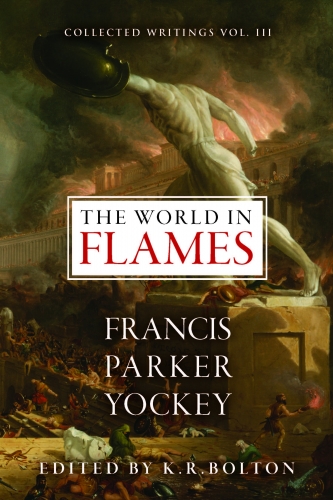 La musique est rarement entendue en Amérique, ayant été remplacée par le battement de tambour sans culture du noir. Comme le dit un musicologue américain: «Le rythme du jazz, tiré de tribus sauvages, est à la fois raffiné et élémentaire et correspond aux dispositions de notre âme moderne. Cela nous excite sans répit, comme le battement de tambour primitif du danseur de la prière. Mais il ne s'arrête pas là. Il doit en même temps tenir compte de l'excitabilité de la psyché moderne. Nous avons soif de stimuli rapides, excitants et en constante évolution. La musique est un excellent moyen d’excitation, syncopé, qui a fait ses preuves. »
La musique est rarement entendue en Amérique, ayant été remplacée par le battement de tambour sans culture du noir. Comme le dit un musicologue américain: «Le rythme du jazz, tiré de tribus sauvages, est à la fois raffiné et élémentaire et correspond aux dispositions de notre âme moderne. Cela nous excite sans répit, comme le battement de tambour primitif du danseur de la prière. Mais il ne s'arrête pas là. Il doit en même temps tenir compte de l'excitabilité de la psyché moderne. Nous avons soif de stimuli rapides, excitants et en constante évolution. La musique est un excellent moyen d’excitation, syncopé, qui a fait ses preuves. »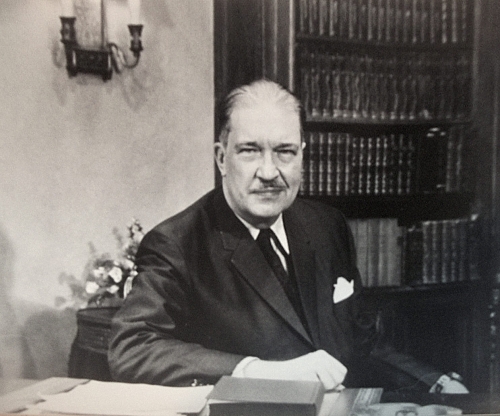
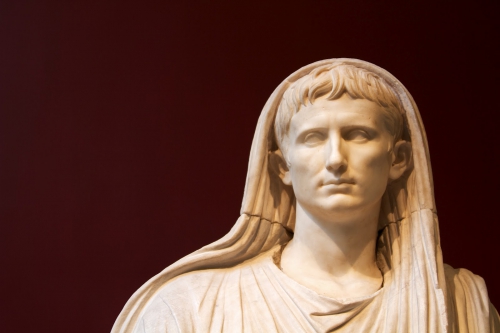
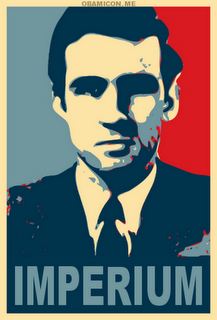 Well, not quite. Tate, whose attitude toward Spengler is generally approving, seems to be straining at a gnat here. The answer to his question is that individual action and “organic determinism” can and do coexist. They do not contradict each other. Denizens of a high culture do not turn into a herd of mindless cattle simply because some force majeure is in operation.
Well, not quite. Tate, whose attitude toward Spengler is generally approving, seems to be straining at a gnat here. The answer to his question is that individual action and “organic determinism” can and do coexist. They do not contradict each other. Denizens of a high culture do not turn into a herd of mindless cattle simply because some force majeure is in operation. The “Judeo-African cacophony” mesmerizing the jitterbugs on the dance floors of the Thirties was part of a larger program to debauch the conservative Christian rhythms of American life.
The “Judeo-African cacophony” mesmerizing the jitterbugs on the dance floors of the Thirties was part of a larger program to debauch the conservative Christian rhythms of American life.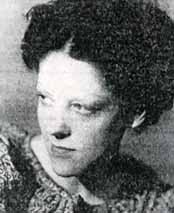 Elsa (niet: Elza) Dewette zag op 12 april 1903 te Sint-Amandsberg bij Gent het levenslicht. Ze was de kleindochter van Eduard Blaes (1846-1909), een verdienstelijke componist, dirigent en muziekleraar, bij wie haar vader pianoles had gevolgd. Afgaande op haar eigen getuigenis hoorde ze haar vader en haar grootvader vaak discuteren over de filosoof Friedrich Nietzsche (1844-1900), over de dichter Heinrich Heine (1797-1856) en over de beroemde componist Richard Wagner (1813-1883). Volgens haar latere leerling Oscar Van Malder, zouden die discussies "een diepgaande invloed uitoefenen op haar later leven en werken"; verheft hij een hypothese niet tot de rang van een feit?
Elsa (niet: Elza) Dewette zag op 12 april 1903 te Sint-Amandsberg bij Gent het levenslicht. Ze was de kleindochter van Eduard Blaes (1846-1909), een verdienstelijke componist, dirigent en muziekleraar, bij wie haar vader pianoles had gevolgd. Afgaande op haar eigen getuigenis hoorde ze haar vader en haar grootvader vaak discuteren over de filosoof Friedrich Nietzsche (1844-1900), over de dichter Heinrich Heine (1797-1856) en over de beroemde componist Richard Wagner (1813-1883). Volgens haar latere leerling Oscar Van Malder, zouden die discussies "een diepgaande invloed uitoefenen op haar later leven en werken"; verheft hij een hypothese niet tot de rang van een feit?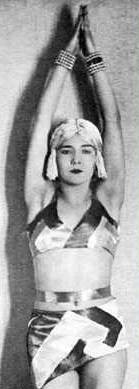 Daarna volgde de grote stap, die erop gericht was gans Vlaanderen te veroveren. Met Herman Teirlinck (1879-1967) als animator begon in Aalst een ware triomftocht. Het heeft geen zin de vele successen op te sommen, daar ze in de kranten breed uitgesmeerd zijn geworden. De uitzondering bevestigt de algemene regel en dus maak ik twee uitzonderingen: in 1939 voerden op de Grote Markt te Kortrijk 1.500 danseressen en dansers 10 dagen lang het Vredesspel op en in 1944 grepen talrijke opvoeringen van Tijl Uilenspiegel op muziek van Richard Strauss (1864-1949) plaats. Bij de Bevrijding kende haar vader moeilijkheden omdat een hogere Duitse officier hem een bezoek had gebracht (cf. infra). Zij zelf reisde begin 1946 naar de U.S.A., bezocht er in diverse steden familieleden en vrienden, en hield lezingen in de Engelse taal (cf. infra).
Daarna volgde de grote stap, die erop gericht was gans Vlaanderen te veroveren. Met Herman Teirlinck (1879-1967) als animator begon in Aalst een ware triomftocht. Het heeft geen zin de vele successen op te sommen, daar ze in de kranten breed uitgesmeerd zijn geworden. De uitzondering bevestigt de algemene regel en dus maak ik twee uitzonderingen: in 1939 voerden op de Grote Markt te Kortrijk 1.500 danseressen en dansers 10 dagen lang het Vredesspel op en in 1944 grepen talrijke opvoeringen van Tijl Uilenspiegel op muziek van Richard Strauss (1864-1949) plaats. Bij de Bevrijding kende haar vader moeilijkheden omdat een hogere Duitse officier hem een bezoek had gebracht (cf. infra). Zij zelf reisde begin 1946 naar de U.S.A., bezocht er in diverse steden familieleden en vrienden, en hield lezingen in de Engelse taal (cf. infra).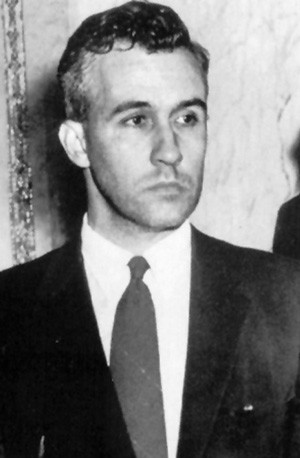 F.P. Yockey werd in 1917 in Chicago geboren. Al vroegtijdig ontpopte hij zich als een goede pianist en gold hij als een begaafde humorist. In de herfst van 1934 kwam hij op de University of Michigan (Ann Arbor) terecht. Hier werd hij uit een Saulus een Paulus, d.w.z. hij gaf zijn pro-communistische overtuiging prijs en werd bij wijze van spreken een Amerikaanse nazi. Die ommezwaai wordt toegeschreven aan zijn lectuur van Der Untergang des Abendlandes, het tweedelige opus magnum van de Duitse historicus en niet-nazi Oswald Spengler (1880-1936), doch het is een uitgemaakte zaak dat hij door de spengleriaans getinte Kulturgeschichte der Neuzeit (3 delen; 1927-31) van de Oostenrijkse Jood Egon Friedell (eig. Friedmann; 1878-1938 [zelfmoord]) tot de overtuiging was gekomen, dat niet materiële factoren, doch ideeën het historisch verloop bepalen. De ironie van het lot heeft dus gewild dat twee eminente Europese niet-nazis onrechtstreeks een Amerikaanse nazi hebben voortgebracht!
F.P. Yockey werd in 1917 in Chicago geboren. Al vroegtijdig ontpopte hij zich als een goede pianist en gold hij als een begaafde humorist. In de herfst van 1934 kwam hij op de University of Michigan (Ann Arbor) terecht. Hier werd hij uit een Saulus een Paulus, d.w.z. hij gaf zijn pro-communistische overtuiging prijs en werd bij wijze van spreken een Amerikaanse nazi. Die ommezwaai wordt toegeschreven aan zijn lectuur van Der Untergang des Abendlandes, het tweedelige opus magnum van de Duitse historicus en niet-nazi Oswald Spengler (1880-1936), doch het is een uitgemaakte zaak dat hij door de spengleriaans getinte Kulturgeschichte der Neuzeit (3 delen; 1927-31) van de Oostenrijkse Jood Egon Friedell (eig. Friedmann; 1878-1938 [zelfmoord]) tot de overtuiging was gekomen, dat niet materiële factoren, doch ideeën het historisch verloop bepalen. De ironie van het lot heeft dus gewild dat twee eminente Europese niet-nazis onrechtstreeks een Amerikaanse nazi hebben voortgebracht!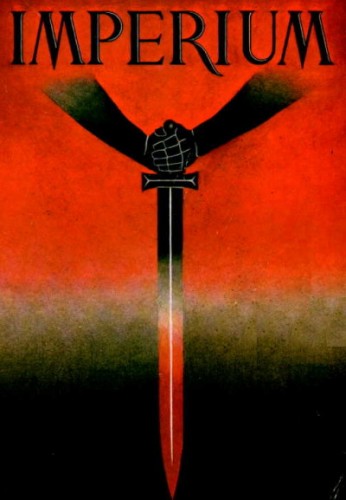 Stimely werd helaas in december 1992 het slachtoffer van aids, zonder "ooit een bladzijde van zijn geplande Yockey biografie" te hebben geschreven.
Stimely werd helaas in december 1992 het slachtoffer van aids, zonder "ooit een bladzijde van zijn geplande Yockey biografie" te hebben geschreven.